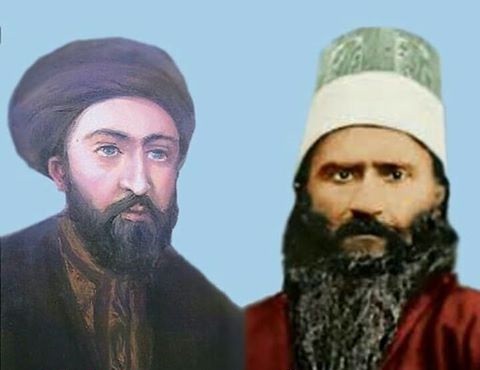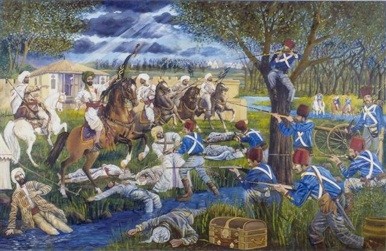According to this principle and the aforementioned statements from `Abdu’l-Bahā, if a religion causes enmity and hatred, its non-existence is better than its existence. Thus, it logically follows that if Bābism and Baha’ism caused enmity and hatred, they are subject to `Abdu’l-Bahā’s decree and their non-existence is preferred over their existence.
We will now proceed to show the many instances in which the Bābī and Baha’i creeds became a cause of enmity, hatred, and divisions.
آنچه در ادامه می خوانید
Internal Disputes in the Bābī and Baha’i creeds

The history of Bābism and Baha’ism is filled with various enmities and conflicts between their leaders and followers. Much can be said about each conflict, but we will only refer to a small number of them below:
- The conflicts among the Bābīs over the title of Him Whom God Shall Make Manifest.
Twenty seven people among the Bābīs brought themselves forth as the Promised One in the Book of Bayān, such as Mīrzā Yaḥyā Ṣubḥ Azal, Mīrzā Ḥusayn `Alī Nūrī (Bahā’u’llāh), Mīrzā Asad-Allāh Dayyān, Mīrzā Muḥammad Nabīl Zarandī, Mīrzā Ghughā Darwīsh, and Sayyid Baṣīr Hindī.
See Muḥammad `Alī Fayḍī, Ḥaḍrat Bahā’u’llāh, pp. 103–۱۰۴٫
- The conflicts, feuds, and bloodshed between Bahā’u’llāh and his brother Mīrzā Yaḥyā Ṣubḥ Azal and their followers that resulted in the exile of the Azalīs (the supporters of Mīrzā Yaḥyā Ṣubḥ Azal) to Cyprus and the Baha’is to Palestine.
- The conflicts and clashes between `Abdu’l-Bahā and his brother Muḥammad `Alī Effendi.
Bahā’u’llāh had willed that his successor would be Ghuṣn A`ẓam (`Abdu’l-Bahā’) and after him Ghuṣn Akbar (`Abdu’l-Bahā’s brother Muḥammad `Alī): “God has destined the station [for] Ghuṣn Akbar after his position (meaning `Abdu’l-Bahā’), for He is the Commanding Wise. We chose the Akbar after the A`ẓam, an order from the All Knowing and Aware (God). All must show kindness towards the two Ghuṣns . . . All must respect and admire the two Ghuṣns,”
Reference: Bahā’u’llāh, Majmū`iy-i alwāḥ-i mubārak-ih, pp. 302–۳۰۳٫
After Bahā’u’llāh’s death the two brothers differed on the amount of authority they had and fights ensued between them and their followers.
- The disputes and arguments between Shoghi and those who opposed his successorship.
According to Bahā’u’llāh’s orders the successor after `Abdu’l-Bahā was supposed to be his brother Ghuṣn Akbar. `Abdu’l-Bahā disobeyed this decree and instead appointed his own grandson Shoghi Effendi as his successor. This resulted in many differences and conflicts between Shoghi and many Baha’is who didn’t accept his authority.
- The dispute between Rūḥiyyih Maxwell (Shoghi’s widow) and the Hands of the Cause with Mason Remey, the then president of the International Baha’i Council.
In contrast to what `Abdu’l-Bahā had prophesized, Shoghi was sterile and had no children to succeed him. In a bid to become his successor, an internal conflict erupted between Bahā’u’llāh’s followers. Amongst these conflicts, the most intense was the one between Shoghi’s widow (Rūḥiyyih Maxwell) and Mason Remey (President of the International Baha’i Council). Mason Remey claimed that the UHJ established by Rūḥiyyih Maxwell was illegitimate and in a countermove the UHJ excommunicated Mason Remey from the Baha’i community.
Wars during the Bāb’s Era

When the Bāb was imprisoned in Chihrīq, Muḥammad Shah of Qājār passed away and the princes and nobles of the court became preoccupied with the issues of succession. This put the country in a state of chaos and turmoil. The Bābīs took advantage of this situation and began to riot under the orders of the Bāb. These riots eventually lead to three bloody wars in three different regions of Persia.
The first war began in the first days of the reign of Nāṣir al-Dīn Shāh in the Fort of Sheikh Ṭabarsī in Māzandarān and was led by Mullā Ḥusayn-i-Bushrū’ī and after his death by Mīrzā `Alī Bārfurūshī. These clashes have been described in detail in The Dawn Breakers:
“The day had not yet broken when at the signal, “Mount your steeds, O heroes (The original Farsi word used is jangjoo which means ‘combatant’ not ‘hero’.) of God!” . . . Mullā Ḥusayn and two hundred and two of his companions ran to their horses and followed Quddūs . . . He forced his way through the gate and rushed into the private apartments of the prince.”
Reference: Nabīl Zarandī, The Dawn-Breakers: Nabīl’s Narrative of the Early Days of the Bahā’ī Revelation (US Bahā’ī Publishing Trust, 1932), p. 365.
“Mullā Ḥusayn . . . mounting his charger, gave the signal that the gate of the fort be opened. As he rode out at the head of three hundred and thirteen of his companions to meet the enemy, the cry of “Yā Sāhibu’z-Zamān!” again broke forth. Mullā Ḥusayn first charged the barricade which was defended by Zakariyyay-i-Qādī-Kalā’ī, one of the enemy’s most valiant officers. Within a short space of time, he had broken through that barrier, disposed of its commander, and scattered his men. Dashing forward with the same swiftness and intrepidity, he overcame the resistance of both the second and third barricades, diffusing, as he advanced, despair and consternation among his foes. Undeterred by the bullets which rained continually upon him and his companions, they pressed forward until the remaining barricades had all been captured and overthrown.”
Reference: Nabīl Zarandī, The Dawn-Breakers: Nabīl’s Narrative of the Early Days of the Bahā’ī Revelation, p. 379–۳۸۰٫
The second clash occurred in the city of Nayrīz with the uprising of Sayyid Yaḥyā Dārābī and this clash also left behind a large number of casualties.
Reference: Nabīl Zarandī, The Dawn-Breakers: Nabīl’s Narrative of the Early Days of the Bahā’ī Revelation, pp. 465–۵۰۰٫
The third clash occurred in Zanjān between the Bābīs and the government forces. The casualties in this conflict were at least 1800 from the Bābī side:
“I have heard it stated that one of the companions of Hujjat who undertook to record the names of those who had suffered martyrdom, had left a written statement in which he had computed the number of those who had fallen prior to the death of Hujjat to be a thousand, five hundred and ninety-eight, whilst those who had suffered martyrdom afterwards were thought to have been in all two hundred and two persons.”
Reference: Nabīl Zarandī, The Dawn-Breakers: Nabīl’s Narrative of the Early Days of the Bahā’ī Revelation, p. 580.
Was the cause of these wars and massacres, anything other than the religion of the Bāb and the beliefs of a group of Bābīs? Did these individuals not cause their own destruction, as well as that of many others, because they rioted and fought for their faith and the love they had for the Bāb?
Bābism, which is the root of Baha’ism, openly ordered its followers to start wars and cause bloodshed. In contrary to what Baha’is claim in their history books and want non-Baha’is to believe, the Bābīs were not a group of oppressed and peace-loving people who were merely protecting their women and children from the Persian government:
That humiliating episode was soon followed by a number of similar attempts on the part of the supporters of the governor, all of which utterly failed to achieve their purpose. Every time they rushed to attack the fort, Hujjat would order a few of his companions, who were three thousand in number, to emerge from their retreat and scatter their forces. He never failed, every time he gave them such orders, to caution his fellow-disciples against shedding unnecessarily the blood of their assailants. He constantly reminded them that their action was of a purely defensive character, and that their sole purpose was to preserve inviolate the security of their women and children. “We are commanded,” he was frequently heard to observe, “not to wage holy war under any circumstances against the unbelievers, whatever be their attitude towards us.”
Reference: Nabīl Zarandī, The Dawn-Breakers: Nabīl’s Narrative of the Early Days of the Bahā’ī Revelation, p. 546.
The peaceful and oppressed face of the Bābis and Baha’is, as well as the historical narratives presented in the books authored by Nabīl Zarandī (many of which were later used by Shoghi Effendi) should be taken with a grain of salt. Nabīl Zarandī was one of the many people who had falsely claimed to be “the One Whom God Shall Make Manifest.” The words of someone who tries to falsely attribute such a supposedly high station to himself should be met with healthy skepticism.
`Abdu’l-Bahā clearly announces:
“The utterance of the [book or religion] of Bayān in the day of the appearance of his Highness A`lā (meaning the Bāb) was to behead, burn the books, destroy the monuments, and massacre [everyone] but those who believed [in the Bāb’s religion] and verified it.”
Reference: `Abdu’l-Bahā, Makātīb (Egypt), vol. 2, p. 266.
The savagery in the Bāb’s laws can clearly be seen in Bahā’u’llāh’s words too:
“The unbelievers and the faithless have set their minds on four things: first, the shedding of blood [beheading]; second, the burning of books; third, the shunning of the followers of other religions; fourth, the extermination of other communities and groups. Now however, through the strengthening grace and potency of the Word of God these four barriers have been demolished, these clear injunctions have been obliterated from the Tablet and brutal dispositions have been transmuted into spiritual attributes.”
Reference: Bahā’u’llāh, Tablets of Bahā’u’llāh Revealed After the Kitāb-i-Aqdas, p. 91.
Since the Bābīs denied Bahā’u’llāh’s station, he refers to them as: “unbelievers and the faithless.” Regarding killing and savagery, `Abdu’l-Bahā says:
If religion causes killing and savagery it is not religion and having no religion is better than that. For religion is meant to be a cure. If a cure causes sickness then of course, no cure is better than it. Thus, if religion causes war and slaughter, then of course, it is better to have no religion.
Reference: `Abd al-Ḥamīd Ishrāq Khāwarī, Payām-i malakūt, pp. 44–۴۵٫
According to these words, since the Bab gave orders for war, massacres, and plunder, then Bābism is not a religion. But then the question arises, if Bābism is not a religion, then what is Baha’ism? Did Baha’ism not arise as a continuation of Bābism and as a result of the tidings of the Bab to Him Whom God Shall Make Manifest? Does Baha’ism not proudly present itself as the spiritual successor to Babism? If Bābism is not a valid religion—which according to the current principle is not—then neither is Baha’ism.






